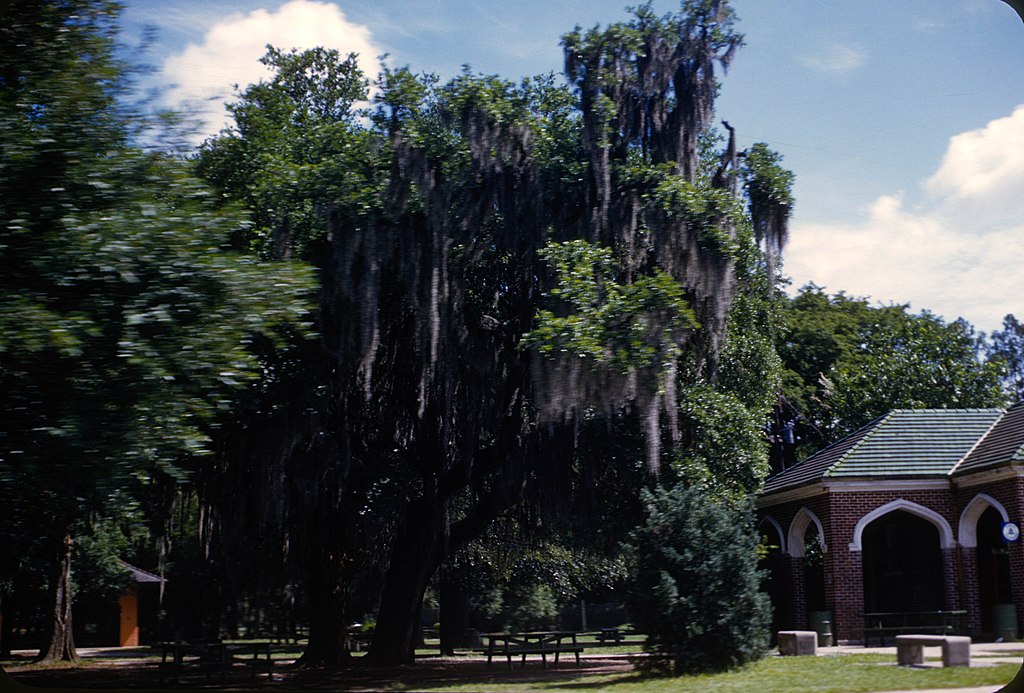
Photograph by David Wipf. Spanish moss, City Park, New Orleans, June 1958, via Wikimedia Commons. Licensed under CC BY 2.0.
Nancy Lemann’s work is deceptive in its meandering. She is thinking deeply even when it seems as if her thoughts are floating. Her laser powers slice into idiocy (and dice it) while they also beam sympathetically onto, as she would call it, the folly of the human condition. Her work evokes something old-fashioned in its manner and tone, and this proves to be a way she keeps herself from being subsumed in the clichés of modern culture even as she is examining it. But she is observing the human being of today. One of her passions is history, with particular attention to architectural preservation and travel. Though she is describing us, we feel she is looking at us from another time, through the lens of the ages.
Nobody writes like Nancy Lemann. You might recognize slivers of other writers within her work, writers whom she first revered: Evelyn Waugh, Anthony Trollope, Elizabeth Hardwick, Barry Hannah, and her beloved mentor, Walker Percy.
The first time I read her work—in a writing workshop in college in New England, where I met her—I felt enveloped in a new atmosphere. I still remember one of her lines, just as I remember first reading Faulkner describe Caddy: “She smelled like trees.” This was Nancy: “You know you’re in the South when you’re wearing a yellow dress, and in the North when you’re wearing a black one.” I learned she was from New Orleans and that her last name was pronounced like the fruit. I thought she was merely channeling the atmospheric city of her youth. She was indeed channeling an atmospheric world, but it wasn’t only the world of New Orleans, it was the world of Nancy Lemann.
We got to know each other after college through correspondence. I had moved home after my mother’s death to be with my eight-year-old sister, and Nancy had moved back to New Orleans. We wrote letters often. I received glorious ten-page single-spaced letters, typed on thin rice paper. Many of these ended up being the first draft of what would become her first book—the iconic, unforgettably magical, and hilarious Lives of the Saints, a love letter to her hometown. She is now one of my oldest friends, so you may not believe me when I say she is also one of the funniest people I know. But it’s true.
From early on she has been both a worshipper and a dismisser. She is transcendent when describing her admiration for the noble and the flawed. She champions the underdog, giving special attention to the imperfect and the sensitive and the kind. She skewers with an extra slice the pretentious and the cruel.
Her own character is as beautifully stubborn and honest as her prose, and I’ve often seen on her face an expression of conflict between wanting to say something she knows to be true and feeling that it may cause offense. Fortunately, in her work, as mostly in life, the truth wins out. She has stuck to her unique sensibility and its power—the wit of repetition, the refusal to employ certain narrative conventions—and it has often cost her publications and publishers. Apparently they do not recognize comic literary genius when it appears before them. (Luckily, some editors do.)
Susan Minot is an award-winning novelist, short-story writer, poet, and screenwriter.
from The Paris Review https://ift.tt/SxgNIuj
Comments
Post a Comment